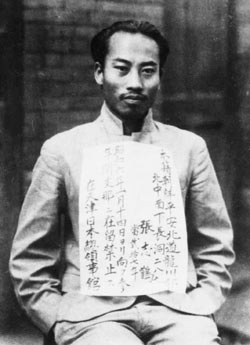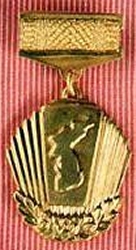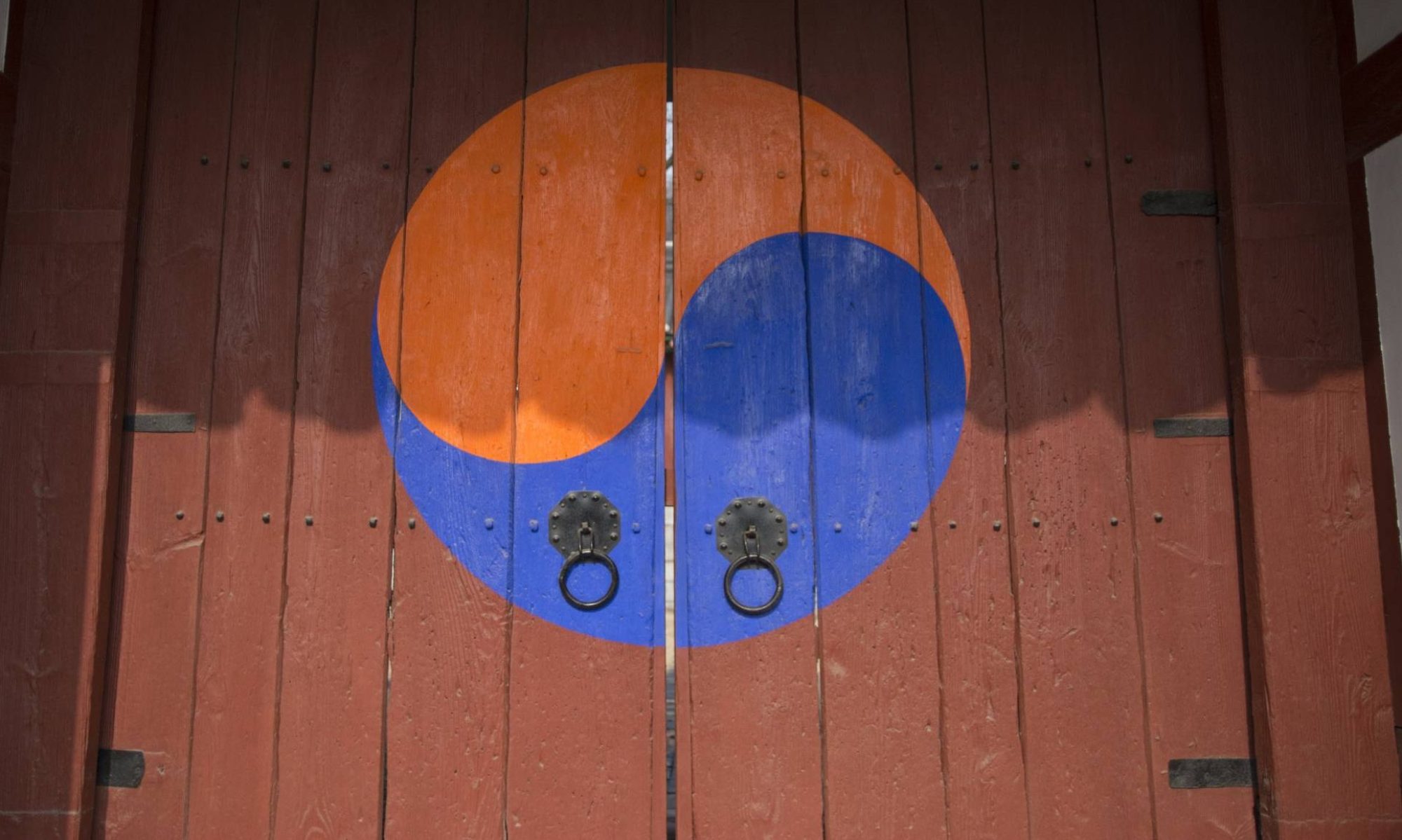Leftist Independence Activists to Get Honors
In August 2005, a list was unveiled by which 214 people would get state honors for independence activities during the 1910-1945 Japanese colonial period. The ROK Ministry of Patriots and Veterans Affairs also announced that during the 60thanniversary of National Liberation Day (Aug. 15), there were plans to confer Orders of Merit on 47 left-wing independence activists.1 The list of Leftest Independence Activists includes, among others:

Kim San 김산 (金山)2 (1905-1938), whose thoughts and activities as a communist and independence fighter are heroically pictured in Nym Wales’ book, entitled “Song of Arirang: A Korean Communist in the Chinese Revolution”. In 1938, he was framed and labelled as a “Trotskyist and Japanese spy” and arrested by Chinese Communist Security and subsequently executed. (He had been arrested, incarcerated and tortured twice by the Japanese, but released. There was considerable speculation as to why he was released.) He was reinstated by the Central Committee of the Communist Party of China in January 1983 after his son, Gao Yong-guang’s (高永光) made a request in 1978 for the recovery of his father’s honor. Kim San was posthumously awarded the Order of Merit for National Foundation, Patriotic Class 애국장 (愛國章), by the South Korean government. His son was present to receive the award at the ceremony in Seoul, Korea.
Also included on the list is Kim Chul-su 김철수 (金綴洙, 1893-1986) who was a key figure in organizing independence activities among Korean students in Japan. He received an Order of National Foundation, Independence Class 독립장 (獨立章). Kim was linked to a central committee member of the Choson Communist Party in the 1920s and was arrested for that association, twice receiving jail terms by the Japanese authorities. He later quit political activities when Yo Un-hyung, another independence activist and politician who tried to bridge the gap between the left and the right after the nation’s liberation, was assassinated in 1947. Disillusioned with the extreme leftist power struggle, he returned to his hometown, built a hut, and spent the remainder of an impoverished life there. At one point in his life, he was offered a position during the Rhee Syngman government and refused, saying he could not work with pro-Japanese factions. He had taken the lead in the independence movement, but because he was a socialist / communist, for the remainder of his life, he was subjected to the 1st level of surveillance by the South Korean public security authorities. He was also not welcome by North Korea because of his ethnic orientation, he had been born in Jeollanam-do (전라남도), a province in South Korea.
Other socialist independence activists, such as Kim Tae-yon 김태연 (金太軟 1891-1921) and Kim Han 제관(霽觀 1887-1938), who led the independence movement mainly in China and Russia, were posthumously honored with Order of National Foundation, Independence Class 독립장 (獨立章).
The honors were awarded to living independence activists or their survivors at the National Liberation Day ceremony in Seoul or in provincial areas. Embassies delivered the medals to those who live abroad. The ministry recognized left-wing independence activists for the first time on the occasion of the 86th anniversary of the March 1st Independence Movement of 1919. This was a change from the previous policy of completely excluding “Communists” as recipients of national awards and decorations. The ministry had revised the relevant regulations the previous February. Now, only those who are accused of activities aimed at setting up a communist country or those who actively cooperated with such schemes remain outside official tribute. A proposal to include Kim Il Sung in the 2005 group of award recipients was voted down.

This change in policy towards communism is hard to imagine for many Koreans. Probably the most repressive legal statute in South Korea is the National Security Act 국가보안법 (國家保安法), which has been on the books since July 5, 1948. Under this law, communism was illegal. Political Prisoner No. 3597 was held in solitary confinement for 43 years and 10 months (a world record according to Amnesty International). Amnesty International also reported that he “only had some six visits in over 40 years of imprisonment”. During his imprisonment, the South Korean army executed his father and sister, as a way of punishing him for having joined the North Koreans. Under the Korean military governments from the 1960s through the 1980s, guilt by association was widely applied to family members of political prisoners.3 He was released in 1995, at which time he recovered his original name, Kim Sun Myung. He could have been released decades earlier had he renounced his political beliefs and denounced North Korea and communism. Even after release, he remains defiant. Mr. Kim was released conditionally from prison, and ordered not to speak to reporters, at the risk of spending more years in prison. Being quiet is something he has failed to do. South Korean President Kim Young Sam released Mr. Kim as part of a “grand reconciliation” that also freed other North Korean sympathizers. “Unconverted prisoners,”4 also known as “long term, unswerving prisoners” are those “prisoners of conscience” who have consistently refused to disavow Pyongyang and vow allegiance to Seoul. The last two unconverted prisoners walked out of jail on Dec. 31, 1999. In June 2000, South Korean President Kim Dae Jung and North Korean leader Kim Jong-il met in Pyongyang, the first summit between the two nations since the Korean War.5 To sustain the conciliatory inter-Korea mood, the Kim Dae-jung government decided to repatriate 63 former unconverted prisoners to North Korea. On Sept. 2, 2000, the men walked through the border village of Panmunjom. They had spent a total of 2,045 years in prison, an average of 32.5 years each, and none of the 63 had converted. Each of the returnees was later awarded the North Korean National Reunification Prize 조국통일상 (祖國統一賞).6 The South Korean Ministry of Unification refused permission to let their immediate family members go north with them. Former prisoners who had ‘converted’ due to mental and physical torture, including starvation, were not eligible for repatriation. North Korea did not reciprocate.
A non-communist award recipient on that day in 2005, was Hyeon Jin-geon 현진건 (玄鎭健 1900 – 1943), a prominent novelist. He received a Presidential Medal. In 1932, he was deeply shocked by the arrest and death of his third brother, Jeong Geon (鼎健), a communist who was active in Shanghai. On August 25, 1936, while serving as social affairs director for Dong-a Ilbo 동아일보 (東亞日報 newspaper), they published a picture of Sohn Kee-chung 손기정 (孫基禎 1912-2002), winner of the Gold Medal in the 1936 Berlin Olympics marathon race. The newspaper had erased the Japanese flag from the front of Sohn Kee-chung’s uniform. The Japanese forced the newspaper to suspend all operations. He subsequently served a short sentence in Seodaemun Prison and was no longer associated with the newspaper. He died impoverished because he refused to produce any pro-Japanese literature, which at the time was the only type of publication that was allowed.
Footnotes:
- Information Source: “Leftist Independence Activists to Get Honors” an article in the Korea Times (Aug. 8, 2005) by Seo Dong-shin, a Staff Reporter.
- Kim San 김산 (金山) translates as “Gold Mountain”. His real name was Jang Ji-hak 장지학 (張志鶴)
- Guilt by Association also known as kin punishment (연좌제, literally “Association System”) is still practiced today in North Korea, which has a three generations law, by which three generations of a family can be imprisoned or executed for the actions of a single family member. The punishment also extends to children born in prison.
- Referred to as 미전향 장기수 (未轉向 長期囚) in South Korea and as 비전향 장기수 (非轉向 長期囚) in North Korea
- Kim Dae Jung, the South Korean president at the time, received the Nobel Peace Prize for successfully arranging the summit. However, three years later, it was revealed that the South Korea had paid North Korea approximately US$500 million to attend the Summit. This caused a major political scandal called the “Cash-for-Summit Scandal” 대북송금사건.
- The National Reunification Prize is an award of North Korea, bestowed by the Presidium of the Supreme People’s Assembly upon Koreans who have contributed to the reunification of Korea. The award was instituted on July 25, 1990.
